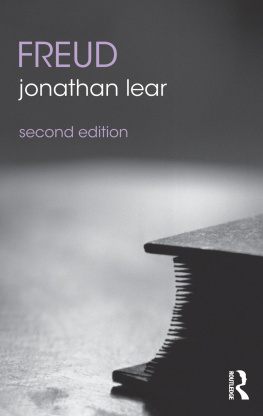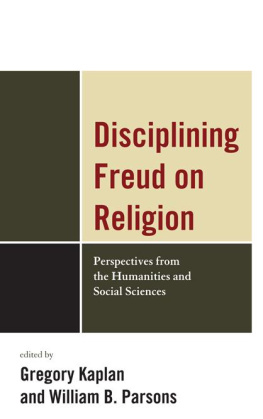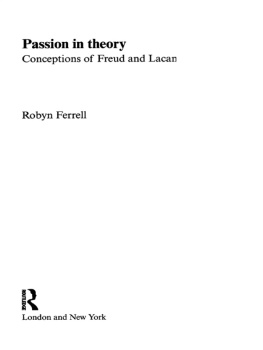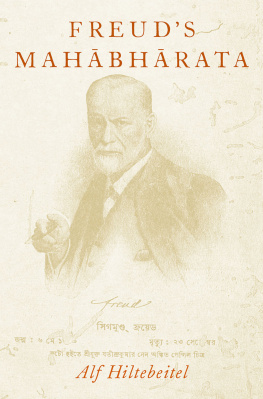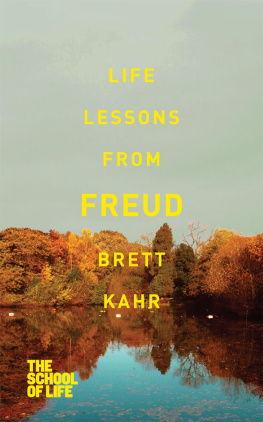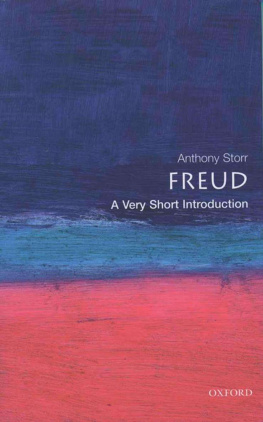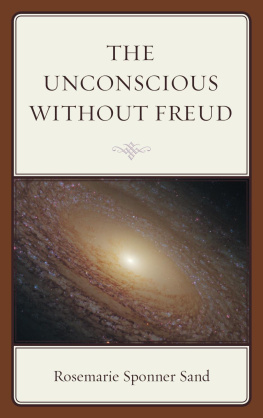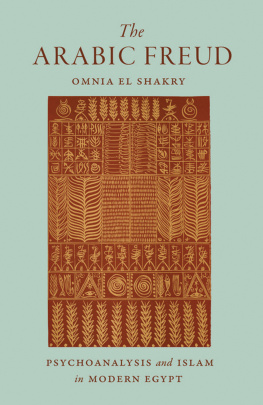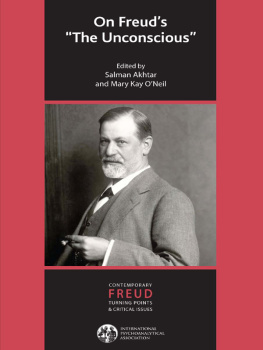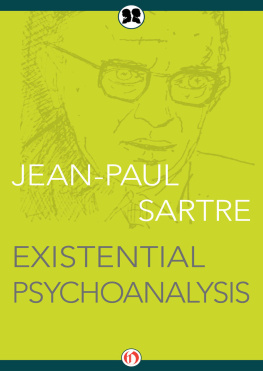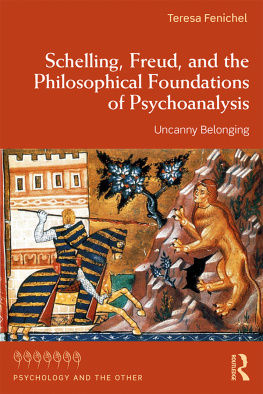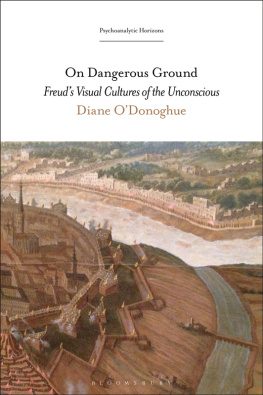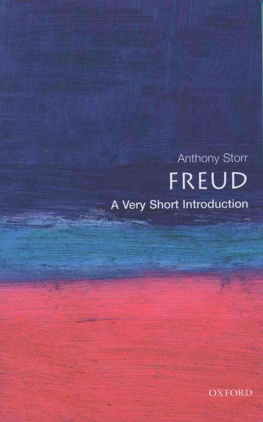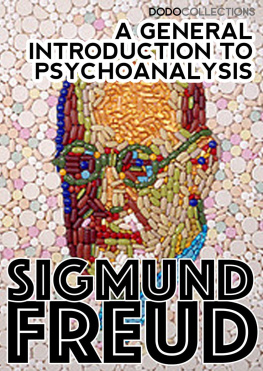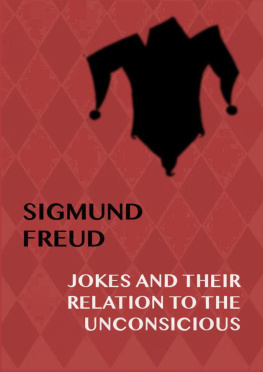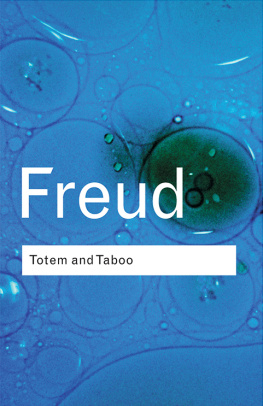Freud
In this fully revised and updated second edition, Jonathan Lear clearly introduces and assesses all of Freuds thought, focusing on those areas of philosophy on which Freud is acknowledged to have had a lasting impact. These include the philosophy of mind, free will and determinism, rationality, the nature of the self and subjectivity, and ethics and religion. He also considers some of the deeper issues and problems Freud engaged with, brilliantly illustrating their philosophical significance: human sexuality, the unconscious, dreams, and the theory of transference.
In this new edition Lear emphasizes the philosophical significance of Freuds fundamental rule to say whatever comes to mind without censorship or inhibition. This binds psychoanalysis to the philosophical exploration of self-consciousness and truthfulness, as well as opening new paths of inquiry for moral psychology and ethics.
One of the most important introductions and contributions to understanding this great thinker to have been published for many years, Freud, second edition will be essential reading for anyone in the humanities, social sciences and beyond with an interest in Freud or philosophy.
Jonathan Lear is the Roman Family Director of the Neubauer Collegium for Culture and Society at the University of Chicago, USA. He is also the John U. Nef Distinguished Service Professor in the Committee on Social Thought and the Department of Philosophy. He is a trained psychoanalyst, and the author of several acclaimed books on philosophy and psychoanalysis, including Aristotle: The Desire to Understand; Love and Its Place in Nature; Open Minded; Happiness, Death and the Remainder of Life and Radical Hope: Ethics in the Face of Cultural Devastation . His most recent book is A Case for Irony (2011). He is a recipient of the Andrew W. Mellon Foundation Distinguished Achievement Award.
The Routledge Philosophers
Edited by Brian Leiter
University of Chicago
Routledge Philosophers is a major series of introductions to the great Western philosophers. Each book places a major philosopher or thinker in historical context, explains and assesses their key arguments, and considers their legacy. Additional features include a chronology of major dates and events, chapter summaries, annotated suggestions for further reading and a glossary of technical terms.
An ideal starting point for those new to philosophy, they are also essential reading for those interested in the subject at any level.
Available:
Hobbes
A P Martinich
Leibniz
Nicholas Jolley
Locke
E J Lowe
Hegel
Frederick Beiser
Rousseau
Nicholas Dent
Schopenhauer
Julian Young
Freud
Jonathan Lear
Darwin
Tim Lewens
Rawls
Samuel Freeman
Spinoza
Michael Della Rocca
Merleau-Ponty
Taylor Carman
Russell
Gregory Landini
Wittgenstein
William Child
Heidegger
John Richardson
Adorno
Brian OConnor
Husserl, second edition
David Woodruff Smith
Aristotle, second edition
Christopher Shields
Kant, second edition
Paul Guyer
Hume
Don Garrett
Dewey
Steven Fesmire
Forthcoming:
Habermas
Kenneth Baynes
Peirce
Albert Atkin
Mill
Daniel Jacobson
Plato
Constance Meinwald
Nietzsche
Maudemarie Clark
Einstein
Thomas Ryckman and Arthur Fine
Plotinus
Eyjlfur Emilsson
Berkeley
Lisa Downing and David Hilbert
Levinas
Michael Morgan
Cassirer
Samantha Matherne
Kierkegaard
Paul Muench
Jonathan Lear
Freud
Second edition
First published 2005
This edition published 2015 by Routledge
2 Park Square, Milton Park, Abingdon, Oxon OX14 4RN
and by Routledge
711 Third Avenue, New York, NY 10017
Routledge is an imprint of the Taylor & Francis Group, an informa business
2005, 2015 Jonathan Lear
The right of Jonathan Lear to be identified as the author of this work has been asserted by him in accordance with sections 77 and 78 of the Copyright, Designs and Patents Act 1988.
All rights reserved. No part of this book may be reprinted or reproduced or utilized in any form or by any electronic, mechanical, or other means, now known or hereafter invented, including photocopying and recording, or in any information storage or retrieval system, without permission in writing from the publishers.
Trademark notice : Product or corporate names may be trademarks or registered trademarks, and are used only for identification and explanation without intent to infringe.
British Library Cataloguing in Publication Data
A catalogue record for this book is available from the British Library
Library of Congress Cataloging-in-Publication Data
Lear, Jonathan.
Freud / by Jonathan Lear. - Second edition.
pages cm - [Routledge philosophers]
Includes bibliographical references and index.
1. Freud, Sigmund, 1856-1939. 2. Psychoanalysis and philosophy. 3. Psychoanalysts-Austria-Biography. I. Title.
BF109.F74L43 2015
150.19'52092dc23
2014030452
ISBN: 978-0-415-83179-6 (hbk)
ISBN: 978-0-415-83180-2 (pbk)
ISBN: 978-1-315-77191-5 (ebk)
Typeset in Joanna MT and Din
by Cenveo Publisher Services
In memory of Sam Ritvo
Contents
One
Interpreting the unconscious |
Two
Sex, Eros and life |
Three
The interpretation of dreams |
Four
Transference |
Five
Principles of mental functioning |
Six
The structure of the psyche and the birth of 'object' relations |
Seven
Morality and religion |
I would like to thank my students at the University of Chicago and my colleagues in the Committee on Social Thought and the Department of Philosophy: they sustain a marvelous environment of questioning and research. I have had longstanding conversations on psychoanalysis and philosophy with Matthew Boyle, Michael Brearley, John Coetzee, David Finkelstein, Irad Kimhi, Gabriel Lear, Lawrence Levenson, Hans Loewald, Anselm Mueller, Edna OShaughnessy, Sebastian Rdl, Eric Santner, William Sledge, Martin Stone, Candace Vogler, Bernard Williams and Richard Wollheim; and I am grateful to them all. Sections of this book were read by Tony Bruce, Benjamin Fong, Sebastian Gardner, Brian Leiter, Nir Ben Moshe, Jerome Neu, Skomantas Pocius and Richard Strier and they all gave helpful comments. I want to express special thanks to Isabela Ferreira who served as an invaluable research assistant on this second edition; and to Jennifer Lockhart who played an equally valuable role on the first edition. In addition to my research and teaching, I have over the past decades been seeing analysands in psychoanalysis. It is in that work that I have developed a capacity to interpret Freud, as well as the judgment to decide where I agree and where I disagree. I am deeply grateful to the Andrew W. Mellon Foundation for its Distinguished Achievement Award, which freed up time for the research and writing of this second edition. Finally, my loving thanks to my family Gabriel, Sophia and Samuel Lear.
This book presents an overall view of Freuds work, one that emphasizes its enduring philosophical significance. I am glad to have been invited to write a second edition because, while I continue to agree with the interpretation of the first edition, my sense of why it matters philosophically has developed. In the first edition I wanted to give a straightforward account of how psychoanalysis works. I wanted to eliminate the aura of mystery that sometimes taints presentations of psychoanalysis, while nevertheless preserving the wonder of human being that it reveals. I have long thought that the familiar criticisms of psychoanalysis flow from misunderstandings of what it is. Therefore a resolutely non-mysterious introduction might be the best response.

